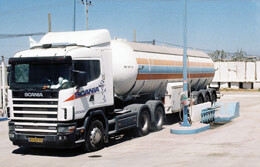The Electronic Intifada 10 November 2007

Gaza’s crucial Nahal Oz border crossing with Israel. (Shabai Gold/IRIN)
The court was hearing a petition lodged by 10 Israeli and Palestinian human rights groups, and the deputy-director of the Gaza Coastal Municipalities Water Utility (CMWU), demanding an end to the restrictions.
Since implementing sanctions on 28 October, Israel has cut supplies of regular diesel by more than 40 percent and industrial gasoline, vital for Gaza’s power plant, by about nine percent, according to the UN Office for the Coordination of Humanitarian Affairs(OCHA) and Gaza petrol companies.
Israel said it had cut fuel by about 15 percent overall, but refrained from limiting electricity since its Attorney-General, Menahem Mazuz, ordered a policy review to ascertain it would not cause a humanitarian crisis.
However, the rights groups say cutting the fuel alone is “collective punishment” and illegal.
“We hope the court will not accept the state’s position. They should not use closures and sanctions like this for political reasons,” said Issam Younis of Al Mezan, one of the petitioners.
“At any given time 15 percent of the population in Gaza is not receiving an adequate amount of running water to their homes,” said Maher Najjar, deputy director of the CMWU. That number was likely to increase, he added.
“Currently, there is no spare fuel to run the water system, and the sewage system has enough fuel only for one more week,” he said. Other officials have expressed concern for hospitals in the event of power cuts.
Israeli officials said the sanctions, meant to further detach Israel from Gaza and persuade Palestinian militants to cease firing rockets at its southern towns, would not have harmful humanitarian repercussions.
The government told the court on 2 November that calling the move “collective punishment” is “mistaken and absurd.”
Sanctions protests
Both the association of truck drivers who transport fuel from Gaza’s Nahal Oz border crossing with Israel and the association of filling station owners staged sit-ins on 6 November to protest against the sanctions.
Gaza has only about five days of diesel stocks remaining at current rates of importation, the petrol companies said.
John Ging, Gaza chief of UNRWA, the UN Agency for Palestinian Refugees, told IRIN on 7 November that the dwindling fuel supplies would affect aid deliveries and health.
“Immediately, one focuses on fuel needed by municipalities for water wells and to keep sewage pumping stations going. And also for sanitation trucks to collect garbage, otherwise there will be public health problems,” he said, noting that UNRWA received its fuel supplies from the local Gazan market.
Currently, there is no spare fuel to run the water system, and the sewage system has enough fuel only for one more week.
Fuel is also needed for trucks that distribute food aid to the poorest in Gaza where some 1.1 million people, out of 1.5 million residents, receive rations from the UN.
The new sanctions include the closing of the Sufa crossing point into Gaza, used to bring in about 65 percent of food supplies, leaving only the Kerem Shalom crossing open.
However, between 1 and 3 November, Kerem Shalom was also closed by Israel, according to OCHA.
“There must always be a humanitarian crossing open into Gaza,” insisted Ging.
In parts of Gaza there are shortages of cheese and meat products as well as rice, canned foods and oil. In other areas, some products are no longer available altogether.
This item comes to you via IRIN, a UN humanitarian news and information service, but may not necessarily reflect the views of the United Nations or its agencies. All IRIN material may be reposted or reprinted free-of-charge; refer to the copyright page for conditions of use. IRIN is a project of the UN Office for the Coordination of Humanitarian Affairs.
Related Links

